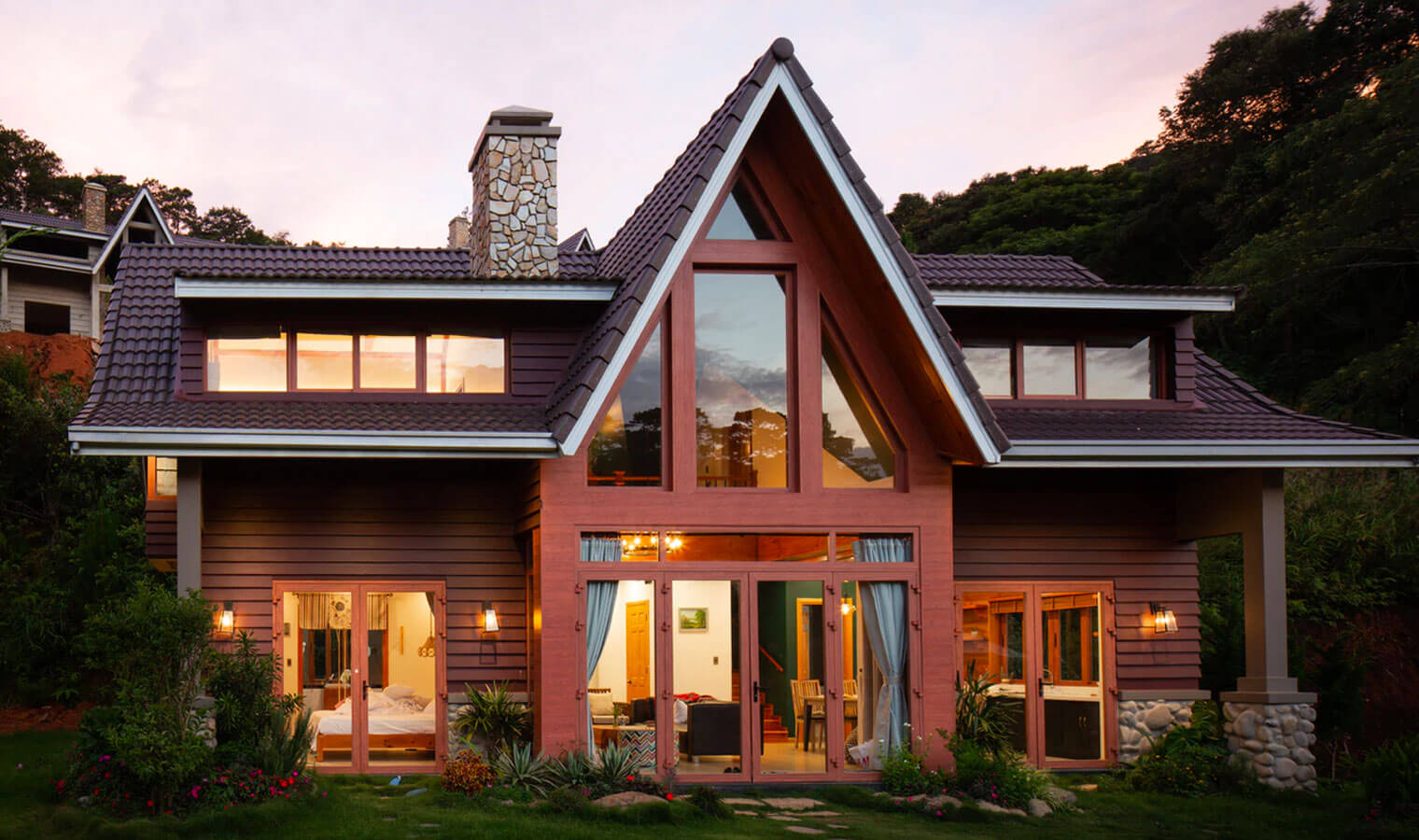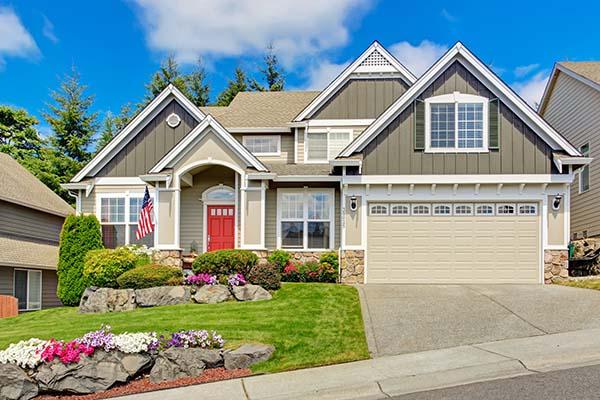
New paint can transform your home and give it a new look. Keep these things in mind when choosing the color of your house: your style and neighborhood, as well as your budget. You may want colors that are complementary to your landscaping, brick, or wooden trim.
Avoid choosing dark shades if you live near a warm climate. These colors absorb heat and keep your home cool. These colors are great for modern homes. For a more muted look, you might choose a lighter or neutral color.
Blue-gray is a popular exterior color. They are soft, welcoming, and complement a variety of materials. While a neutral color will work well, you can also choose a pop of color to highlight your front door or window frames. Your shutters and soffits could even be colored.

Sage green is a beautiful color to use on your home's exterior. This color is subtle but blends well into your existing landscaping. This color will stand out against white or black accents and can be used to match your trim or as a main colour. It will complement both Victorian and Craftsman style homes.
Blue gray with turquoise accents is a popular exterior color combination. This simple and classic style can be combined with any style. It can also be paired with an olive exterior colour. If you want to attract buyers, it is a good choice. If you are looking to add some drama, try adding a darker blue accent color.
One of the newest trends in home exterior design is to paint your home in two different colors. In addition to creating a fresh look, this will allow you to create an interesting juxtaposition. If you have a green roof, consider pairing it with a darker blue. If your brick or stucco home is brick- or stucco-clad, specialty paint might be needed to match it.
Monochromatic shades are another way to combine two colors. These shades only have one color. However, they look lighter outside your home than on the paint chip. There are many colors to choose from, so you can find the right shade for you. Check with your local regulations before you start painting. You may have to comply with lead paint safety guidelines.

If you are looking to sell your property, you have the option to go all-white. White will reflect light which will make your home appear larger. It is a perfect color for buyers to envision themselves as homeowners.
If you aren't sure what color to choose for your home, a professional colour consultant can help. You should also consider the roofing, siding, windows, and other exterior elements of your home. All of these elements will affect the overall appearance of your home.
FAQ
What should I consider when buying a new home?
You need to ensure you have enough funds available to cover closing costs before you buy a home. You may want to refinance your mortgage if there isn't enough cash.
How much does it take to renovate a home?
Renovations are usually between $5,000 and $50,000. Most homeowners spend around $10,000 to $20,000 on renovations.
How many times do I need to change my furnace filter?
It all depends on how frequently your family uses your home heating system. It is worth changing your filter more often if you intend to spend a lot of time outside during winter months. If you're not often out of your home, however, you may be more able to wait for the filter to change.
A furnace filter should last for approximately three months. This means that you should replace your filters every three months.
For information on when to replace your filter, you can consult the manufacturer. Some manufacturers recommend that you replace your filter after every heating season. Others suggest waiting until there are visible dirt deposits.
How do you choose a good contractor to work with?
When choosing a contractor, ask friends and family members for recommendations. Check out online reviews. Make sure that the contractor you choose has experience in the area of construction that you are interested in. Ask for references and check them out.
Is there anything I can doto save money on my home renovation?
It is possible to save money by doing the work yourself. Consider reducing the number or people that you employ during renovations. You might also look for ways to decrease the cost and use of materials in the renovation.
Is it better to remodel an older house than build a brand new one?
There are two options if your goal is to build a new home. Pre-built homes are another option. This home is ready for you to move into. You can also build your own home. If you choose this option, you will need to hire someone to help you design your dream home.
It all depends on how much you spend designing and planning the home. Because you will likely be doing most of the work yourself, a custom home can require more effort. However, you have more control over what materials you use and where they are placed. So, it might be easier to find a contractor who specializes in building custom homes.
A new home is typically more expensive than one that has been renovated. That's because you'll pay more for the land and any improvements you make to the property. Permits and inspections are also required. On average, the difference in price between a new and remodeled house is $10,000 to $20,000.
How can I avoid being ripped off while renovating my home?
Knowing what you're paying for is the best way to avoid being scammed. Make sure you read every word of the contract before signing it. Don't sign any contracts that aren't complete. Always ask for a copy of the signed contract.
Statistics
- It is advisable, however, to have a contingency of 10–20 per cent to allow for the unexpected expenses that can arise when renovating older homes. (realhomes.com)
- Design-builders may ask for a down payment of up to 25% or 33% of the job cost, says the NARI. (kiplinger.com)
- According to the National Association of the Remodeling Industry's 2019 remodeling impact report , realtors estimate that homeowners can recover 59% of the cost of a complete kitchen renovation if they sell their home. (bhg.com)
- The average fixed rate for a home-equity loan was recently 5.27%, and the average variable rate for a HELOC was 5.49%, according to Bankrate.com. (kiplinger.com)
- A final payment of, say, 5% to 10% will be due when the space is livable and usable (your contract probably will say "substantial completion"). (kiplinger.com)
External Links
How To
5 Things You Should Know Before Starting Your House Renovation
-
Is this something you really want? If you are planning to do major home improvements like renovating your bathroom or building new houses, you will likely need help. However, if you feel unsure about your ability to complete such a big task by yourself, you might consider hiring someone to help you. It could take up a lot of your time and money, and you won't get any real benefits from it. Instead, why not hire someone who knows what they're doing to help out? These people will save you time, stress, and provide a beautiful place to live in.
-
How much should I budget? This may seem obvious but it could make things worse if you spend too much on your renovation project. It's because you'll most likely be responsible for paying back the majority of the costs. If you have a budget in place, stick with it. You could wind up spending a lot and not getting any return.
-
Do I prefer to hire professionals or DIY? - While there is no right or wrong answer, we recommend that you hire professional tradespeople if possible. They can give you sound advice about how to proceed with your project. They can install the plumbing correctly and make sure that it is done safely. DIY projects can be frustrating because they require a lot more trial and error. This means that you will have to learn many lessons from the experience. You'll also have to deal with any problems that may arise throughout the process.
-
Can I afford it? - Don’t underestimate the cost associated with a home renovation. Even if your budget is tight, you may need to borrow money to cover costs. When you want to sell your existing property quickly after the renovations are complete, you will need to account for the price of selling it.
-
Where do I start? There are no right or wrong places to begin when choosing where to start. But we suggest you choose something that you enjoy working on. That way, you'll be motivated to keep going, and you'll be less likely to procrastinate. Avoid areas that require constant maintenance. You shouldn't redecorate your living space if you are constantly cleaning up dirt and dust.